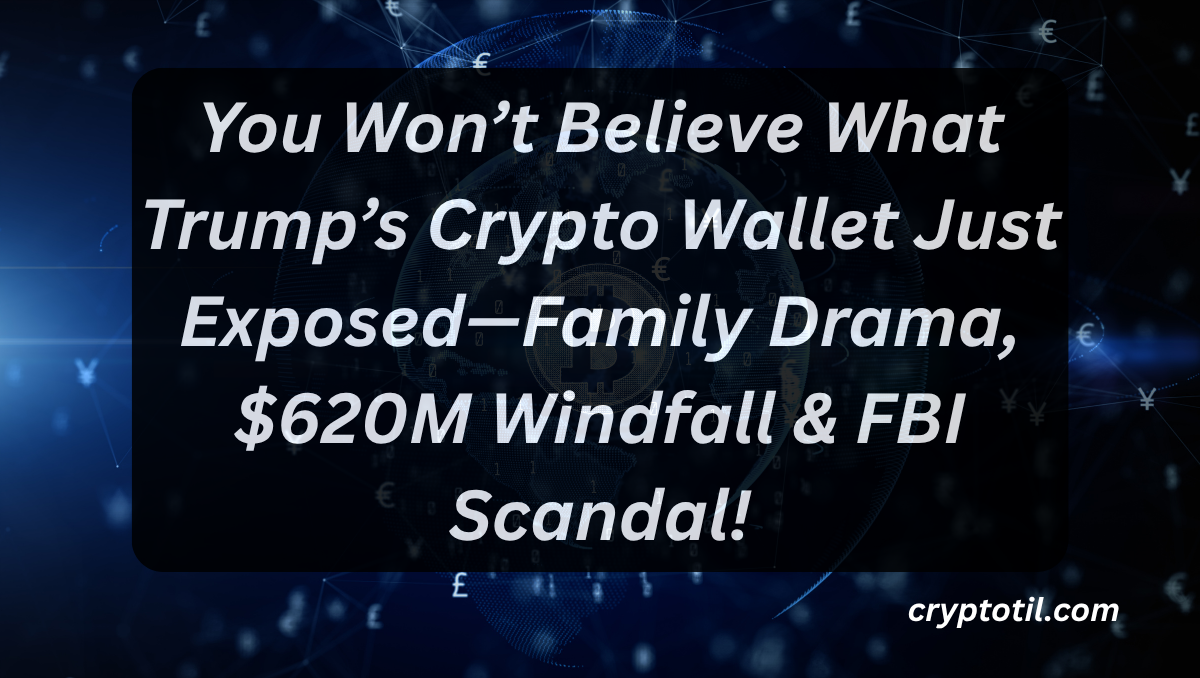When it comes to high-stakes drama, Donald Trump’s crypto adventures might just outshine the political theater. In the past month alone, jaw-dropping revelations about Trump’s crypto wallet have surfaced—from a family dispute that led to his branded memecoin wallet being publicly disowned, to a staggering $620 million boost in his net worth thanks to savvy crypto plays. Add in an FBI criminal complaint targeting a crypto impersonation scheme, and you’ve got a saga worthy of front-page headlines.
In early June, reports emerged that Magic Eden and World Liberty Financial (WLF)—the Trump family–backed blockchain platform—clashed over a proposed digital wallet project. According to insiders, Trump’s own sons posted on X (formerly Twitter) that the wallet initiative “isn’t moving forward,” abruptly halting a plan that critics say risked diluting the Trump brand. Mere weeks later, a Guardian exposé quoted an anonymous family member proclaiming, “I know nothing about this project,” disowning the crypto wallet entirely and fueling speculation of deep fractures within the Trump inner circle theguardian.com.
Yet while the family feud played out in public view, Trump’s personal holdings quietly exploded. According to a Bloomberg report, his crypto ventures now account for nearly 9% of his total wealth, adding $620 million to his portfolio in just months nypost.com. Arkham Intelligence data further break down that sum: approximately $320 million in Ethereum, $180 million in Bitcoin, and the balance in memecoins such as $TRUMP and $DJT—tokens launched under various Trump-affiliated entities.
What makes this windfall especially intriguing is its source: World Liberty Financial’s token sales reportedly netted $550 million, with roughly $390 million flowing directly to the Trump family accounts nypost.com. Meanwhile, the Official Trump memecoin (ticker: $TRUMP) launched at the White House inauguration continues to trade actively, with Trump’s stake valued at around $150 million as of June 2025. These figures underscore a strategic pivot from traditional real estate and media holdings into fast-moving digital assets.
However, these gleaming figures haven’t escaped regulatory scrutiny. On July 2, the U.S. Attorney’s Office in Washington, D.C., filed a complaint seeking recovery of $40,300 in cryptocurrency from a scheme that impersonated the Trump–Vance Inaugural Committee justice.gov. Per federal prosecutors, scammers fraudulently convinced a donor to transfer over $250,000 in crypto—later laundering some funds through wallets purportedly tied to Trump’s inaugural group. The FBI managed to freeze and recover roughly one-sixth of the stolen digital cash, but the incident tarnishes Trump’s broader crypto narrative.
The market responded almost immediately. Major crypto-related equities saw upticks, with Bitcoin edging up 0.9% and Coinbase shares rallying over 2% in premarket trading—an apparent vote of confidence in Trump’s pro-crypto stance despite the legal noise barrons.com. MicroStrategy, the business intelligence firm heavily invested in Bitcoin, led gains with a 3.2% jump, suggesting that institutional players view Trump’s crypto involvement as a net positive for digital asset adoption.
Yet for all the bullish sentiment, risks abound. The disowned wallet project and the impersonation scam highlight persistent vulnerabilities in the nascent crypto space. Experts warn that mere association with high-profile figures like Trump can attract opportunistic bad actors, from phishing scams to elaborate token rug pulls. “When celebrity branding meets decentralized finance without ironclad controls, the potential for fraud skyrockets,” notes one blockchain analyst.
So what’s next for Trump’s crypto wallet saga? Several possibilities loom:
- Rebranding & Relaunch. Should Trump’s team resolve its internal disputes, we could see a revamped wallet product—this time with clearer governance and on-chain auditing to restore confidence.
- Regulatory Filings. With crypto’s political profile surging, the SEC and CFTC may probe token classifications and fundraising disclosures, especially for high-profile offerings tied to public figures.
- Institutional Partnerships. Rumors persist of White House–endorsed DeFi pilot programs, potentially integrating $TRUMP or WLF tokens into government-approved digital asset initiatives—a move that could legitimize Trump’s crypto ventures.
From an SEO perspective, readers hungry for the latest “Trump crypto wallet news,” “Trump crypto holdings,” and “Trump memecoin update” are flocking to catch every twist. To optimize visibility, publications should weave these keywords naturally into headlines, subheads, and metadata—capturing search traffic as the story evolves.
Meanwhile, the broader implications of Trump’s crypto leap extend beyond headlines. His embrace of digital assets signals a potential shift in public policy: a presidential candidate publicly advocating for blockchain innovation, tokenized finance, and even central bank digital currency (CBDC) frameworks. Should Trump—or any high-profile leader—drive federal crypto legislation, the entire industry could gain accelerated clarity on tax treatment, custody requirements, and market structure standards.
Ultimately, Trump’s crypto wallet saga is more than a tabloid fascination. It underscores a zeitgeist moment where politics, finance, and technology collide. As digital assets continue their march toward mainstream legitimacy, the role of celebrity endorsements—and the regulatory guardrails that follow—will shape whether crypto remains the “Wild West” of finance or matures into a cornerstone of the 21st-century economy.
Stay tuned: with every new disclosure, court filing, or Twitter post, the “Trump Crypto Wallet” narrative promises to deliver fresh twists. Whether you’re a seasoned investor, a blockchain developer, or simply crypto-curious, these developments warrant close attention. After all, in a world where fortunes can be minted overnight—both legally and illicitly—the tale of Trump’s crypto wallet may rewrite the rules for political finance in the digital age.
